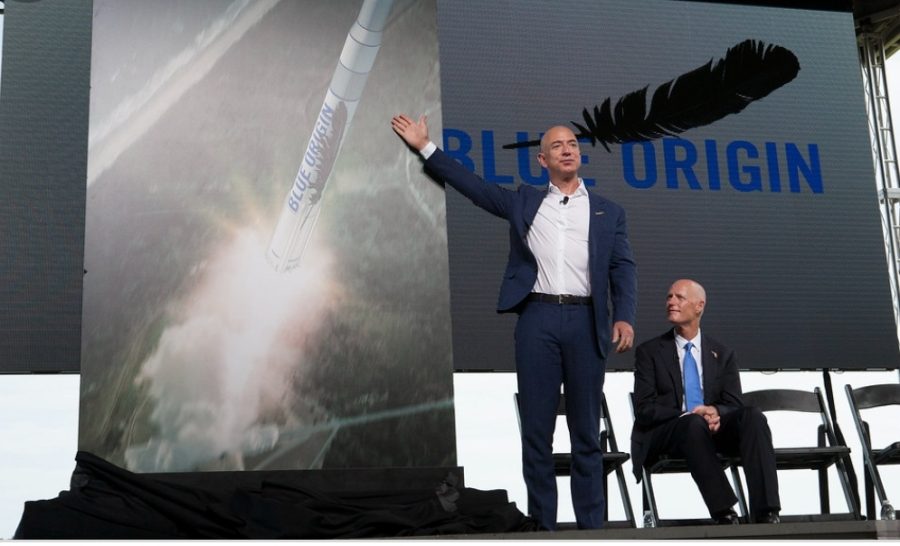The Rise of Space Tourism Guarantees an Enthralling Future for Humanity
After decades of research and development, the tourism industry has officially made it to the final frontier. On March 31, 2022, Jeff Bezos’ company, Blue Origin, launched six crew members into space. This is Blue Origin’s 20th mission and fourth flight carrying human passengers in the spacecraft, and marks the beginning of a new era of space travel. Billionaire entrepreneurs, such as Bezos, Elon Musk and Richard Branson, have been at the forefront of making space travel a more commercialized and accessible commodity.
However, tickets for seats on Blue Origin and other space travel companies’ missions are currently priced at anywhere from hundreds of thousands to millions of dollars. Thus far, passengers vying for seats have consisted of celebrities and business executives alike. This brings into question who space travel is becoming accessible for — is it as available as Bezos and Musk might make it seem, or is this sector of the market really only obtainable for the top one percent?
For now, the latter appears to be the case. On Friday, April 8, a Texas based aerospace company, Axiom Space, plans to launch four passengers in a SpaceX Crew Dragon to the International Space Station for a one-week stay. The tickets cost a cool $55 million. In the meantime, Branson’s company, Virgin Galactic, is currently accepting $1,000 deposits to reserve a ticket, which experts have estimated may cost upwards of $400,000. Prices have not been clarified yet. Blue Origin has not disclosed commercial ticket prices at this time either, although apparently customers can email the company with inquiries if interested.
The demand for and interest in commercial space travel has already demonstrated that an extraordinarily profitable market is bursting at the seams of the private sector. Again, those purchasing seats on these trips have mainly consisted of business elites and the upper-upper class who can afford costs that are “out of this world.” However, as these companies continue to build more equipment and schedule more and more different kinds of trips, space travel will become much more accessible to the wider public in the near future. Competition between companies has encouraged the rapid advancement and development of the technology needed for these expeditions.
These advancements could signify that space travel might have a similar trajectory to the adoption of the current airline industry. Right now, space travel is only truly affordable and available to a select few, but this will probably change as prices drop and companies improve infrastructure and technology. Similar to the expansion of the airline industry, space travel, which is nowan elite luxury commodity for the upper class, may eventually reach the more general public as the demand for affordable, rapid travel continues to increase. There is a massive market for space travel beyond just billionaire interests. UBS has estimated that the space travel industry in its entirety will soon become a billion dollar market, and that high speed travel via outer space will eventually grow to compete with airline flights.
Bezos, Musk and other aerospace entrepreneurs aren’t just dreaming big — they are stepping directly into the future of modern travel and exploration into space. To the average American citizen, it might feel like space travel is still eons away. That being said, widely accessible, commercialized space travel is one of the most imminent next steps in the technological advancement of human civilization, and it’s much nearer in the future than one may suspect. NASA is investing in Blue Origin and other companies to develop designs for a commercial space station, similar to the International Space Station, and projects like these will continue to expand so that more and more people can participate in space exploration and travel. SpaceX has expressed its intention of using its spacecraft to swiftly transport people from city to city, leaving passengers with commute times of mere minutes rather than long flights of ten hours or more. That’s a huge difference for the thousands of commuters taking long distance business trips each day.
There is definitely strong public interest in space travel. Unfortunately, like with many new and exciting products, it might have to remain a luxury until it has had the time to expand to reach a larger public audience. For now, the safety regulations are not as standardized as in other sectors that are widely available to the public. Not only that, but SpaceX, Blue Origin and other aerospace missions are currently researching the effects of space travel on the human body and the viability of the equipment after repeated use. These elements have not yet been researched enough to guarantee safety and security for every member of the public, and those standards must be thoroughly vetted and established before introducing such groundbreaking technology. But in the meantime, we should certainly keep our eyes toward the skies.








































































































































































































